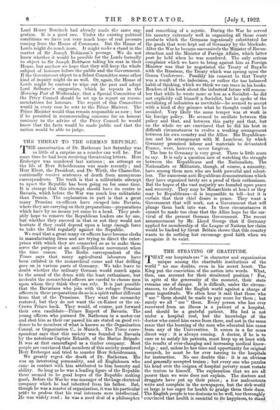THE THREAT TO THE GERMAN REPUBLIC. T HE assassination of Dr.
Rathenau last Saturday was as little of a surprise as a murder can well be. For some time he had been receiving threatening letters. Herr Erzberger was murdered last autumn ; an attempt on the life of Herr Scheidemann was made recently ; and Herr Ebert, the President, and Dr. Wirth, the Chancellor, continually receive sentences of death from anonymous correspondents. The truth is that a militaristic attempt to upset the Republic has been going on for some time. It is strange that this attempt should have its centre in Bavaria, which before the War was much less militaristic than Prussia. The explanation in part is that a great many Prussian ex-officers have escaped into Bavaria, where they are carrying on their preparations—preparations which have by no means yet come to a head. They prob- ably hope to remove the Republican leaders one by one, but whether they succeed in that or not they would not hesitate if they could depend upon a large enough force to take the field regularly against the Republic. We read that a great many ex-officers have become clerks in manufacturing firms and are trying to direct the enter- prises with which they are connected so as to make them serve the purpose of an anti-Republican movement when the time comes. The Berlin correspondent of the Times says that many agricultural labourers have been enlisted in the monarchical cause and that drilling goes on in various parts of Germany. We take leave to doubt whether the ordinary German would march again to the sound of the drum with the least enthusiasm, but no doubt the monarchical officers are careful to choose men upon whom they think they can rely. It is just possible that the Bavarians who join with the refugee Prussian officers in these preparations do so in a spirit rather different from that of the Prussians. They want the monarchy restored, but they do not want the ex-Kaiser or the ex- . Crown Prince back. They would, of course, put forward their own candidate—Prince Rupert of Bavaria. The young officers who pursued Dr. Rathenau in a motor-car and shot him as their car passed his are stated on good evi- dence to be members of what is known as the Organization Consul, or Organization C., in Munich. The Times corre- spondent says that this society was founded in Bavaria by the notorious Captain Erhardt, of the Marine Brigade. It was at first camouflaged as a. timber company. Most people are convinced that members of this society murdered Herr Erzberger and tried to murder Herr Scheidemann.
We greatly regret the death of Dr. Rathenau. His was an interesting personality, and all Englishmen who cam' in contact with him attributed to him honesty and ability. So long as he was a leading figure of the Republic there seemed to be good hopes of the Republic making good. Before the War he was manager of the huge electrical company which he had inherited from his father. But, though he was a master of organization, it was his particular pride to profess that his real interests were intellectual. Ile was widely read ; he was a good deal of a philosopher and something of a mystic. During the War he served his country extremely well in organizing all those ersatz • products which the Germans ingeniously substituted for the goods that were kept out of Germany by the blockade. After the War he became successively the Minister of Recon- struction and the Minister of Foreign Affairs, which latter post he held when he was murdered. The only serious complaint which we have to bring against him as Foreign Minister was that he negotiated the Treaty of Rapallo with the Russians, the Treaty which was sprung upon the Genoa Conference. Possibly his consent to that Treaty was a result of the indecision, or rather the too balanced habit of thinking, which we think we can trace in his books. Readers of his book about the industrial future will remem- ber that while he wrote more or less as a Socialist—he did not explicitly call himself a Socialist, but he spoke of the socializing of industries as inevitable—he seemed to accept with a kind of dry grimace what he thought could not be avoided. Very likely the same temper was at work in his foreign policy. He seemed to oscillate between this policy and that, and between this party and that, but on the whole we are convinced that he did his best in difficult circumstances to evolve a working arrangement between his own country and the Allies. His Republican- ism and his arrangement with M. Loucheur, by which Germany promised labour and materials to devastated France, were, however, never forgiven.
The loss to Germany is very great. There is little more to say. It is only a question now of watching the struggle between the Republicans and the Nationalists. The Nationalists or Militarists, though, of course, a minority, have among them men who are both powerful and relent- less. The numerous anti-Republican demonstrations which they have organized lately are a proof of their enthusiasm. But the hopes of the vast majority are founded upon peace and recovery. They may be Monarchists at heart or they may be Republicans—it is impossible to tell—but it is certain that their chief desire is peace. They want a Government that will work, not a Government that will plunge them back into war. In these circumstances it cannot be made too clear that the Allies hope for the sur- vival of the present German Government. The recent announcement by Mr. Lloyd George that if Germany applied for membership of the League of Nations her claim would be backed by Great Britain shows that this country wants to do nothing but encourage good faith when we recognize it to exist.










































 Previous page
Previous page